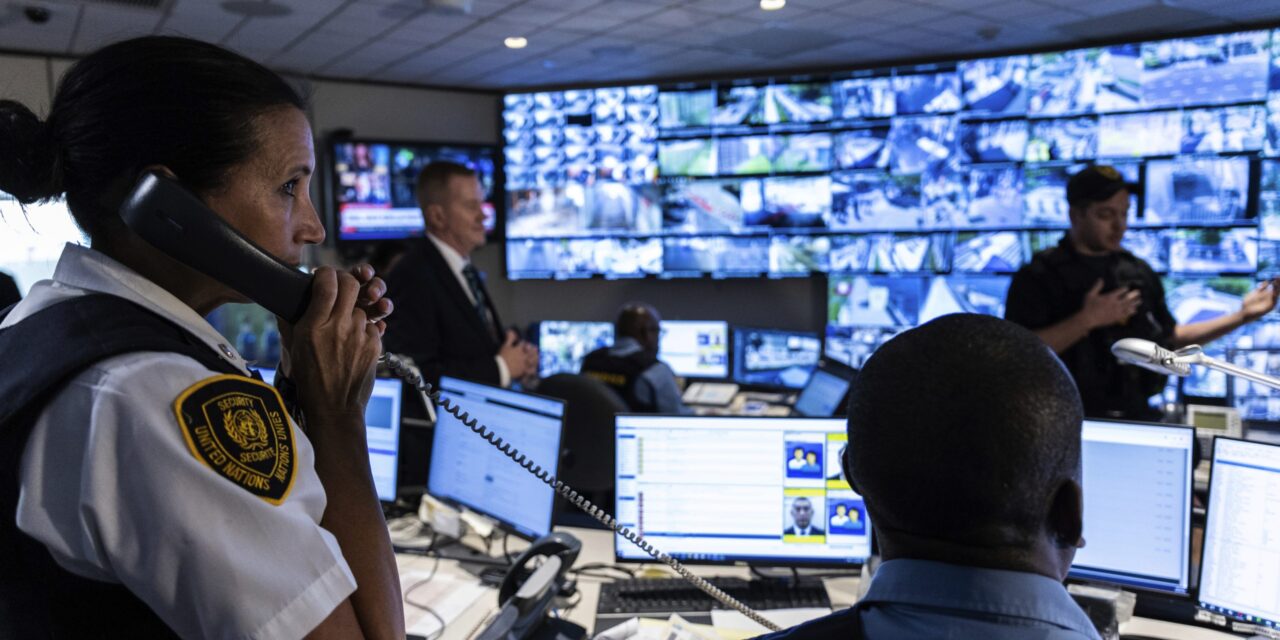This article is from: srnnews.com
UNITED NATIONS (AP) — Below United Nations headquarters, a state-of-the-art security post dubbed the “Brain Center” hums with activity on the eve of next week’s high-level meeting of the U.N. General Assembly. The annual diplomatic pilgrimage is bringing more than 140 world leaders to New York City, including the heads of Israel, Palestine and Ukraine.
Keeping them safe is the U.S. Secret Service’s next big challenge.
The agency, under a cloud after a July assassination attempt on former President Donald Trump, is confident in its multi-layer, multi-agency plan to protect the U.N. General Assembly, which is deemed a Super Bowl-level National Special Security Event.
The plan — developed with New York City police and the U.N. Security and Safety Service, among other agencies — includes not just motorcades and protective details, but NYPD helicopters and patrol boats, a dozen U.N. security K-9 teams sweeping for explosives, road closures and traffic diversions. The Secret Service is bringing in agents from posts around the world for the event. The Coast Guard is restricting East River access near the U.N. and the Federal Aviation Administration is closing airspace.
With so many presidents, prime ministers, monarchs and others dignitaries in one city and under one roof at the same time, the U.N. General Assembly is actually bigger than the Super Bowl. It’s the most complex event the Secret Service is involved in each year.
This year, it’s coming during a especially busy stretch highlighted by the Republican and Democratic conventions and the final weeks of the presidential campaign. Speaking Monday after the Secret Service thwarted another apparent assassination attempt on Trump in Florida, Acting Director Ronald L. Rowe Jr. said employees were “redlining” like an engine pushed to its limit. But, he said, “they are rising to this moment” and meeting the challenges.
“The operational tempo is incredibly high,” said Patrick Freaney, the special agent in charge of the Secret Service’s New York field office.
The Associated Press got a rare look inside security preparations for the U.N. General Assembly, known as UNGA, including the “Brain Center” and a joint operations center that lets the Secret Service, NYPD and other agencies communicate instantly to root out threats and logistical snags. They’re also coordinating with the foreign security services that protect each of the dignitaries.
Freaney said the National Special Security Event designation — for special events of national significance — smooths the way for interagency planning, communication and cooperation. The Secret Service is in charge, but the NYPD’s robust counterterrorism and other operations, and the U.N.’s 300-person Security and Safety Service, play pivotal roles.
“We have over 140 heads of state, heads of government that we’re moving around the city,” Freaney said during a tour of the joint operations center, which has space for 10 local and federal agencies, including the FBI and Federal Emergency Management Agency and the State and Defense departments.
“One of the most important things is bringing all of them in here and then departing safely,” Freaney said. “Think about that logistically — bringing 140 motorcades into one area all at the same time. This plays an integral part of bringing those details in safely.”
The Secret Service, NYPD and State Department will also be operating their own command centers — in Brooklyn, at One Police Plaza in Manhattan and at a nearby hotel ballroom. The NYPD, the nation’s largest police force, has its Joint Operations Center equipped to give officers real-time feeds from security, drone and helicopter-mounted cameras, along with other critical information.
The U.N. Security and Safety Service, which is in charge of keeping the U.N. headquarters campus secure, has its command post in the “Brain Center.”
Down a basement hall from the main hub of U.N. activity, wall-to-wall monitors show live feeds from dozens of the 1,400 security cameras on the 18-acre (7.2-hectare) headquarters campus. All are recorded and can be reviewed instantly. Automated voices alert potential breaches and emergencies. Computers generate real-time data and photos for each of upwards of 22,000 people who pass through security checkpoints per day. Fire alarms tie directly into the city’s central dispatch system for immediate response.
The command post is staffed around the clock by U.N. security officers who work in 12-hour shifts while world leaders are in town. The goal, Inspector Malinda McCormack said, is to receive, analyze and quickly disseminate information.
Security plans for UNGA started to take shape a few months ago. The Secret Service and its partner agencies use past gatherings — this is the 79th edition — as a blueprint, while making adjustments for changing world events such as the wars in Gaza and Ukraine.
“There’s an incredible trust,” said Michael Browne, chief of the U.N. Security and Safety Service. “There’s incredible sense of collegiality and collaboration, which I think is a key ingredient for success in a very complex and challenging operation such as UNGA.”
As of Friday, authorities said, there were no specific or credible threats to the event.
But, Rebecca Weiner, the NYPD’s deputy commissioner for intelligence and counterterrorism, acknowledged “the chaoticness, the diversity and the unpredictable nature of the threat environment” requires law enforcement to be nimble and anticipate all the many ways someone could seek to cause harm.
“These are very different times,” Weiner said.
World leaders are meeting at the UNGA for the first time since Hamas attacked Israel on Oct. 7, 2023, triggered an Israeli offensive in Gaza that has killed tens of thousands of people. NYPD Chief of Patrol John Chell said Friday that the department has tallied more than 4,000 protests over the war, with more anticipated next week.
Israeli Prime Minister Benjamin Netanyahu and Palestinian President Mahmoud Abbas are both expected at UNGA. Ukrainian President Volodymyr Zelenskyy is also expected to return, but not Russian President Vladimir Putin.
While the fighting is an ocean away, authorities are “thinking about what’s happening overseas in these home countries and what we can anticipate here,” Weiner said.
“The whole purpose of this assembly is bringing countries together,” she added. “The whole purpose of our security posture is making sure we’re doing the same.”
Brought to you by www.srnnews.com





















